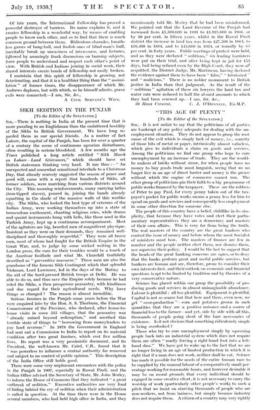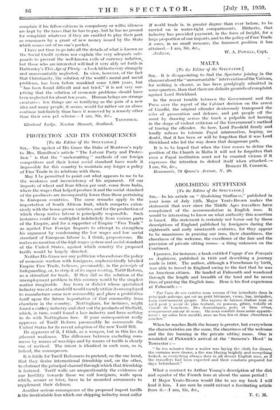"THIS AGE OF PLENTY "
[To the Editor of the SPECTATOR.]
Sin,—It is not unfair to say that the politicians of all parties are bankrupt of any policy adequate for dealing with the un- employment situation. They do not appear to grasp the root cause of the evil which is simply lack of money, i.e., scarcity of those bits of metal or paper, intrinsically almost valueless, which give to individuals a claim on goods and services. Among the politicians we find one group who hope to cure unemployment by an increase of trade. They are the would- be makers of bricks without straw, for when people have no money to buy goods trade most languish, seeing that we no longer live in an age of direct barter and money is the grease without which the engine of commerce cannot run. The other group of politicians pin their faith to a big progra lllll te of public works financed by the taxpayer. These are the robbers of Peter to pay Paul, for every penny taken out of the tax- payer's pocket for public works means a penny less for him to spend on goods and services and consequently less employment in some other direction for someone else.
The people of this country have a belief, childlike in its sim- plicity, that because they have votes and elect their parlia- mentary representatives they are a democracy and masters of their own affairs. This is very far from being the truth. The real masters of the country are the great bunkers who control the issue of money and before whom the most Socialist of ministers must bow. The masters of finance arc few in number and the people neither elect them, nor dismiss them, nor supervise their policy. I would be the last to suggest that the heads of the great banking concerns arc ogres, or to deny that the banks perform great and useful public services, but bankers are human and arc, therefore, prone to consider their own interests first, and their outlook on economic and financial questions is apt to be limited by tradition and by theories of a very conservative nature.
Science has placed within our grasp the possibility of pro- ducing goods and services in almost unimaginable
Labour is plentiful ; all too plentiful. Equipment is plentiful. Capital is not so scarce but that here and there, even now, we get " over-production "—emit and potatoes grown in such quantities that they are a positive nuisance and a source of financial loss to the farmer--and yet, side by side with all this, thousands of people going short of the bare necessaries of existence. Is it not obvious that something ridiculously simple is being overlooked ?
Those who try to cure unemployment simply by squeezing people back into an industrial system which does not require them are often " madly forcing a right-hand foot into a left- hand shoe." We have got to wake 1111 to the fact that we arc no longer living in an age of limited production in which it is right that if a man does not work, neither shall lie eat. Science has made it possible for the needs of the entire human race to be supplied by the manual labour of a comparatively small per- centage working for reasonable hours, and however desirable it may be on moral grounds that every individual should be engaged in some creative effort, it is not necessary to carry the worship of work (particularly other people's work) to such a pitch that we insist on starving thousands of people who are non-workers, not from laziness, but simply because industry does not require them. A citizen of a country may very rightly complain if his fellow-citizens in compulsory or wilful idleness are kept by the taxes that he has to pay, but he has no ground for complaint whatever if they arc enabled to play their part as consumers by a grant of new money issued by the State which comes out of no one's pocket.
I have not time to go into all the details of what is known as the Social Credit system nor explain the very adequate safe- guards to prevent the well-known evils of currency inflation, but those who are interested will find it very ably set forth in Ilattersley's This Age of Plenty—a book hitherto very strangely and unaccountably neglected. In view, however, of the fact that Christianity, the solution of the world's moral and racial problems, has been before mankind some 1,900 years, but " has been found difficult and not tried," it is not very sur- prising that the solution of economic problems should have been neglected for about ten years. human beings are strange creatures : few things are so terrifying as the pain of a new idea and many people, it seems, would far rather see an abuse continue indefinitely than have it removed by a remedy other than their own pet schenw.I am, Sir, &c.,
TAV1STOCE.

















































 Previous page
Previous page